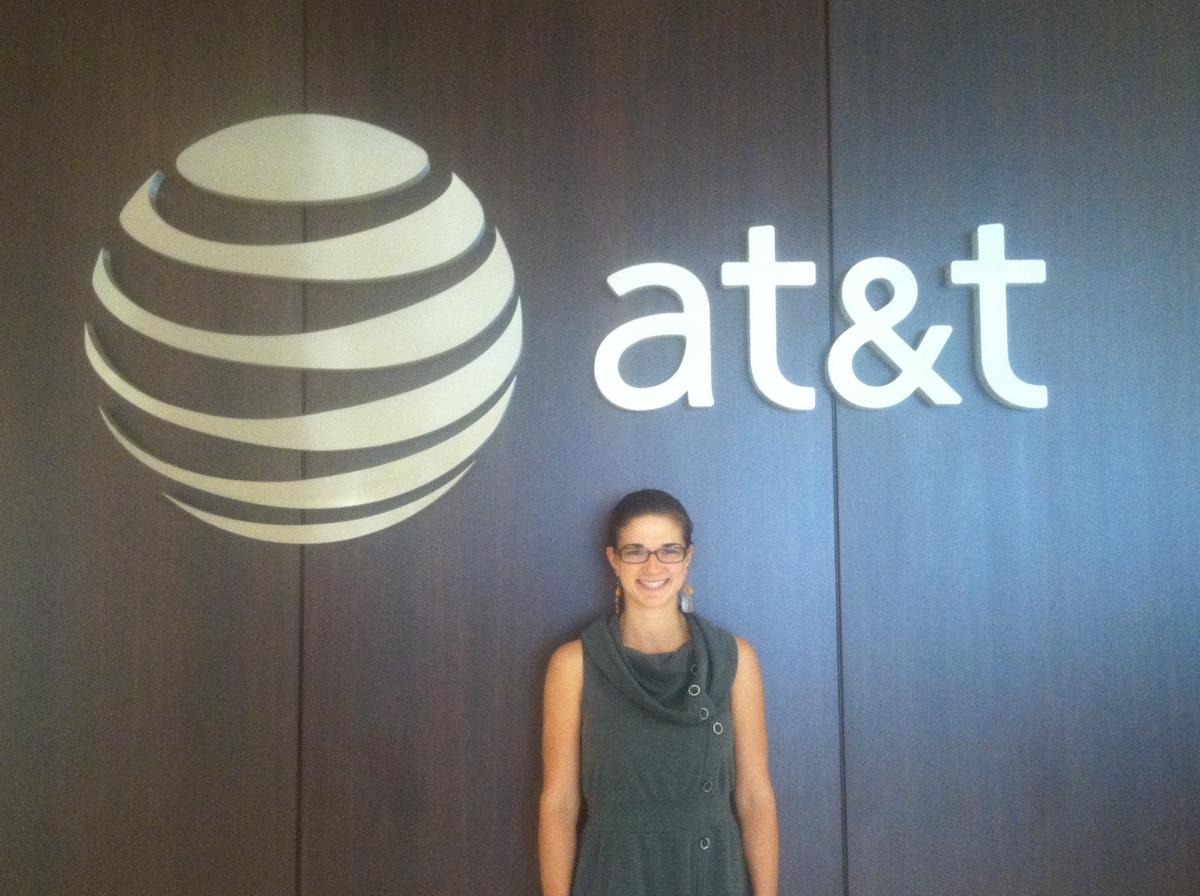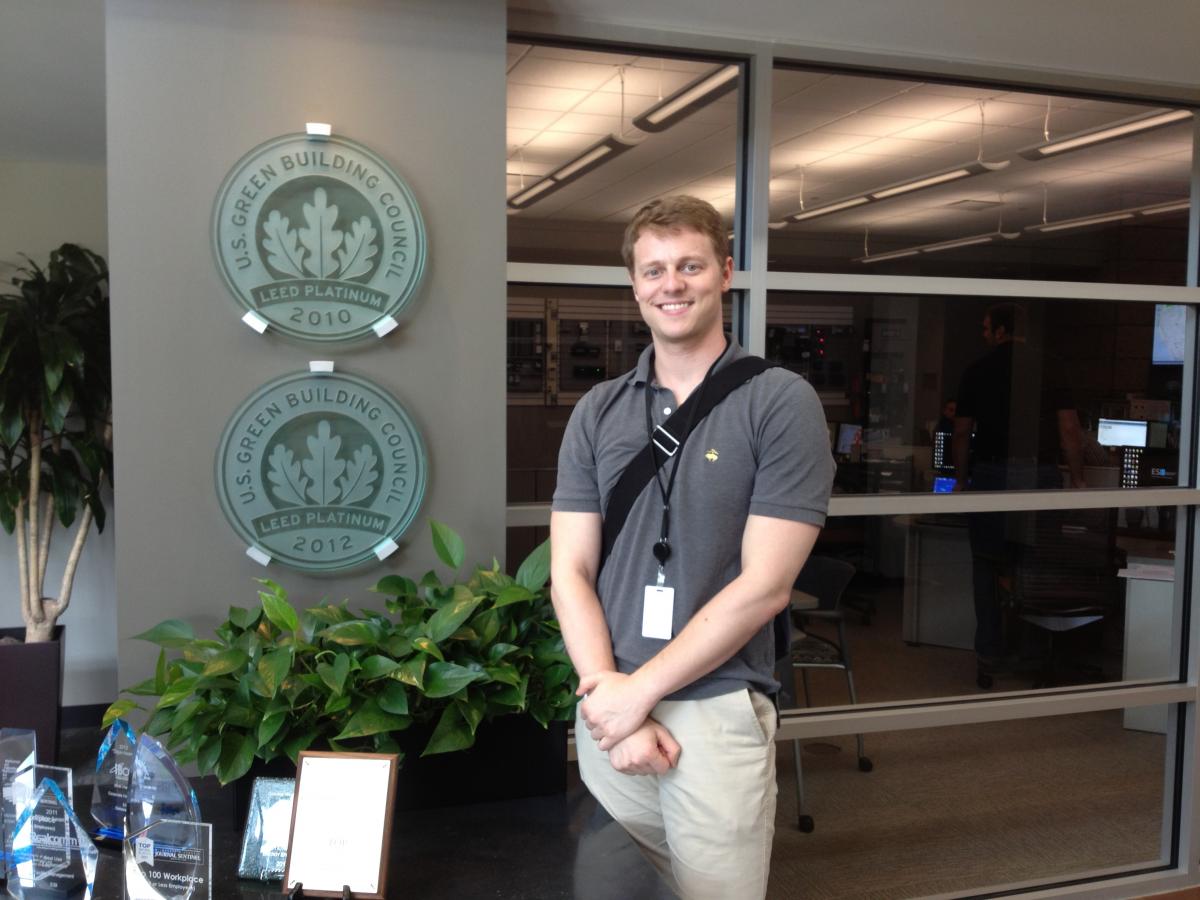EDF Climate Corps fellow | August 20, 2013
CR Magazine ranked AT&T #1 on its Best Corporate Citizens list this year, but even companies that are leading the pack on sustainability can continue to find innovative ways to save energy and water. That's why AT&T partners with EDF. In fact this is the company’s fourth summer hosting EDF Climate Corps fellows to dial up energy savings in its facilities.
In light of AT&T's announcement today about its potential to save 28 billion gallons of water in cooling systems at facilities, we would like to share a bit more about the two AT&T EDF Climate Corps fellows, David Poli and Megan McDonald, who spent their summers focused on the energy-water nexus at the company.

Name: Megan McDonald
Hometown: Vail, CO
School: Presidio Graduate School
Host Organization: AT&T
Q: What is an interesting fact about you?
A: I have fabulous female role models: my mother, both of my grandmothers and my great-grandmother were all college graduates!
Q: Why did you join EDF Climate Corps?
A: EDF Climate Corps was a perfect way to combine my undergraduate studies in engineering and my graduate work in sustainable management. Through the program, I have been introduced to the incredibly robust and diverse network that includes individuals within EDF, fellows from renowned MBA programs across the country and host organizations representing every business sector.
Q: What are you working on this summer?
A: My project centers on a water toolkit that AT&T developed with EDF. I am specifically working on outreach to encourage external organizations in water stressed regions to implement these tools to measure and manage water resources. I have been crafting resources and quick references to assist our team with outreach and to provide supplemental information for organizations considering adoption of the toolkit.
Q: What is one thing you’ve learned this summer?
A: The power of collaboration. It has been eye opening to be part of a team that leverages individual expertise to enhance the final project.
Q: What has been the best part about working at AT&T?
A: Getting to utilize technical knowledge regarding the engineering of cooling towers and non-technical skills associated with the human aspects of behavior change. Also, I’ve been lucky to learn about the operations of a large, multi-national corporation and had opportunities to meet with many individuals across many departments, including senior management.
Q: What is the mark you want to leave on the world?
A: I would love for the world to recognize that a gratifying, fulfilled life and a sustainable lifestyle are not mutually exclusive. A lot of people see sustainable decisions as a sacrifice. I actually find the opposite to be true. Consciousness regarding the limitations of our social, environmental and economic resources helps me recognize the abundance that I have been afforded. I am fortunate to live in an incredibly beautiful place, be surrounded by wonderful people and devote my time to meaningful work without excessive consumption. I hope this encourages others to do the same.

Name: David Poli
Hometown: Chicago, IL
School: Santa Clara University
Host Organization: AT&T
Q: Why did you join EDF Climate Corps?
A: I studied electrical engineering as an undergraduate and then got a job in Chicago designing control systems for nuclear power plants. After a couple of years, I decided I just wasn’t connecting with the job, and I had a nagging ambition to really contribute something to society. After a period of reflection, I concluded I needed to refocus my career on sustainability. I returned to school to pursue a Master of Science degree in Sustainable Energy. A friend who was studying for his PhD in Energy and Resources at Berkeley referred the fellowship to me, and it seemed like a focused and comprehensive, not to mention intensive, way to immerse myself in this sort of world-changing work.
Q: What are some of the projects you’ve been working on?
A: I’m the fourth EDF Climate Corps fellow in a row to work with AT&T, which already has a robust energy efficiency program that has helped control their energy usage over the past few years even as their network has expanded. However, real estate portfolios of this scale and complexity present unique problems that require unique solutions. AT&T has thousands of sites all over the world, so there are a wide variety of energy problems that need to be addressed. The vision of my supervisor, Executive Director of Corporate Energy John Schinter, is to create an “energy cloud” monitoring and visualization system which would take all the data, in real time, from (at first) the largest and highest energy usage sites and make it easily available in the form of an online dashboard. Since this project is in the very early stages of development, my role is to help solidify the concept, communicate its potential through employee engagement and investigate dashboard technologies through pilot projects with vendors.
Q: What are some difficulties or barriers you’ve encountered?
A: I feel extremely grateful to be exposed, at this early stage in my career, to a project of this scale and potential impact. The numbers involved truly are mind boggling, and it seems like every day there’s a new property manager to be engaged at a site in a new state about a new and exciting vendor pilot. What’s more, because the project is still nascent, each pilot requires diligent financial review to confirm viability.
Q: Have you discovered any ways to overcome those difficulties?
A: Luckily, since day one, I’ve been surrounded by some of the best minds in the energy efficiency field, both at AT&T and at EDF, and the guidance and resources they’ve provided me have been invaluable. But remember that I’m not just here to learn, I’m also here to do, and I’ve found that being bold, questioning and forthright with solutions others haven’t perhaps thought of is the best way to reach a solution.
Q: What is one thing you’ve learned this summer?
A: I’ve learned quite a bit about the importance of engagement. In an organization of this size, even stakeholders who may be far removed from my specific project can benefit from what I’m trying to accomplish, and it’s of the utmost importance to engage them on their terms. I’ve learned to be more engaging on a personal, professional and organizational level, and I appreciate the opportunity EDF has given me to develop those skills.
Q: What has been the best part about working at AT&T?
A: I’ll be honest; having so much information about such a massive organization at my fingertips sort of provides the feeling of an omniscient power. I’m regularly working in massive corporate real estate databases and looking at all the data from the sites all over the country, and it’s a rush! Seeing the magnitude of the impact of power usage on an organization like this and being able to make recommendations based off of that data, has been extremely intellectually stimulating, to say the least.
This post is a part of our "Interviews with Tomorrow's Leaders" series. Stay tuned for more interviews with our 2013 EDF Climate Corps fellows!
About EDF Climate Corps
EDF Climate Corps (edfclimatecorps.org) taps the talents of tomorrow’s leaders to save energy, money and the environment by placing specially-trained EDF fellows in companies, cities and universities as dedicated energy problem solvers. Working with hundreds of leading organizations, EDF Climate Corps has found an average of $1 million in energy savings for each participant. For more information, visit edfclimatecorps.org. Read our blog at edfclimatecorps.org/blog. Follow us on Twitter at twitter.com/edfbiz and on Facebook at facebook.com/EDFClimateCorps.